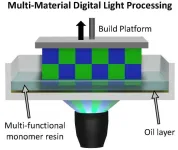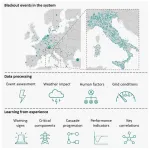(Press-News.org) Recently published in the scientific journal Critical Care Medicine, a review led by the D’Or Institute for Research and Education (IDOR) shed light on the importance of clinical quality registries (CQRs) for the healthcare sector. Also known as electronic medical records, CQRs are systems for collecting and storing health information related to patients and their treatments. The publication includes the collaboration of 15 countries' institutions and shows how the qualified collection of clinical and administrative information has been relevant for optimizing healthcare and management in intensive care units (ICUs).
ICU data for epidemiological maps and scientific research
In addition to being an extraordinary resource for optimizing healthcare, CQRs are also a valuable basis for developing research. Records collected in different health units in different states and countries become a large epidemiological map, allowing a better understanding of regions that are vulnerable to certain diseases, or even highlighting treatment protocols that have better effect than others.
For more than three decades, national records of ICUs have been collected by countries around the world to improve results and the use of resources in these critical care units. In Brazil, the Brazilian ICUs project, led by the Brazilian Intensive Care Medicine Association (AMIB), has a database of more than 4 million ICU admissions.
“The so-called ‘ICU records’ are rich sources for understanding the variety of diseases within ICUs, allowing the characterization of the critically ill patient population. Furthermore, this information also allows for better management of the resources and improvement of quality care”, comments one of the authors of the review, Dr. Amanda Quintairos, who is a doctoral candidate at IDOR, manager, and intensive care physician at Hospital Porto Dias, in Belém, Brazil, and coordinator of the National Registry of Colombian ICUs.
The review confirms the role of these registries in providing patient demographics, variables, and ICU outcome indicators. ICU CQRs provide information on trends in infectious agents, mortality rates, real-world data, and the impact of different hospital interventions on clinical outcomes. With this information, we can also better understand the chain of processes and secondary results in the treatment of important diseases that affect critically ill patients, such as sepsis, acute respiratory distress syndrome, pneumonia, ischemic stroke, and acute myocardial infarction.
“If we take the COVID-19 vaccination as an example, in another study we developed, these records were able to demonstrate the effectiveness of the immunization campaign by reducing the patient mortality curve. We also had other data that reiterated this, such as a reduction in mechanical ventilation requirement”, illustrates the intensivist, adding that this data also facilitates clinical research, as it already offers researchers files detailing risk groups, mortality, and incidence of many diseases, facilitating patient recruitment.
Comparing ICUs from around the world
The publication shows that the use of RQCs is also very important for benchmarking strategies between different hospitals and clinical centers. According to Dr. Quintairos, this comparison is relevant not from a competitive point of view, but because it offers the possibility of optimizing and managing the units' resources.
“When we don’t compare a service with others in the same area, we run the risk of making two mistakes. The first is thinking that we are providing a great service, when in fact we have many opportunities for improvement. And the second error is the opposite, when we are not aware of providing an excellent service, which prevents us from reinforcing strategies that are giving great results and seeing our strengths”, adds the researcher.
Another point highlighted by Quintairos is that the use of data in the management of medical care leaves less room for assumptions, offering more accurate information about epidemiological profiles and the quality of services provided, whether in the public or private sector, or in different regions. This data can be analyzed by different performance metrics, through scores, mortality rates, and quality of care, among many others.
Challenges and Opportunities of CQRs
Despite all its usefulness and relevance for healthcare assistance and research, CQRs still face considerable challenges regarding financing, data governance, security, and quality assurance, as well as transparency in the collected information.
To overcome these challenges, joint efforts are essential across the scientific community, and many international protocols have already been created to adequately capture this information. In developing countries, important initiatives are also taking place to standardize quality indicators in ICUs, which encourages the possibility of a global understanding of effective interventions and comparative health data.
“In Brazil, we still have a challenge regarding organizational culture. Institutions are moving towards acquiring this maturity in data collection and adopting strategic planning centered on this information. However, we still see management based on the doctors' intuition and experience. We need to increasingly disseminate data-based management”, adds the researcher.
Even with their funding challenges, CQRs are already presenting a revolution in healthcare and research. The large volume of data is also a great opportunity for the implementation of artificial intelligence (AI) algorithms, an opportunity that IDOR is already exploring in several other studies through machine learning and natural language processing (NLP).
The current review brings visibility to the growing role of CQRs in modernizing and improving healthcare systems by providing effective means of collecting, storing and sharing medical information. The large database offered by these registries also has great transformative potential, bringing improvements in the quality and safety of medical care, and offering patients the benefits of a more efficient and evidence-based care.
END
Clinical Quality Registries revolutionize clinical research and healthcare in Intensive Care Units
Understand how clinical and administrative data can optimize care services and resource management in healthcare
2023-10-18
ELSE PRESS RELEASES FROM THIS DATE:
Researchers developing ‘revolutionary’ multi-material for light-based 3D printing
2023-10-18
AMES, Iowa – The U.S. National Science Foundation (NSF) is looking for materials that “revolutionize and engineer our future.”
Researchers at Iowa State University and the University of California, Santa Barbara think they can do just that by fundamentally changing Digital Light Processing – a type of 3D printing that users light rather than heat to quickly cure and harden liquid resin into plastic layers – to enable multi-material printing.
“We want to produce two material properties ...
New institute aims to address gap in nation’s health care system through highly effective yet overlooked nutrition interventions
2023-10-18
A newly launched, first-of-its-kind institute aims to address a glaring gap in the medical system by working to integrate food-based nutrition interventions into health care to treat disease and advance health equity.
The Food is Medicine Institute at the Friedman School of Nutrition Science and Policy at Tufts University, launched today, establishes a university-wide initiative aimed at transforming health care through scalable food-based interventions such as: medically tailored meals and prescriptions for produce; nutrition education for doctors; and clinical care, electronic health record, and reimbursement pathways for nutrition-based tools to help treat or prevent ...
Wyss Institute at Harvard University wins BARDA contract to leverage human Organ Chips to advance knowledge and drug-discovery for broad range of health security threats
2023-10-18
By Benjamin Boettner
(BOSTON) — The Biomedical Advanced Research and Development Authority (BARDA), part of the Administration for Strategic Preparedness and Response (ASPR) at the U.S. Department of Health and Human Services (HHS), partnered with the Wyss Institute at Harvard University to support the Institute in advancing its human Organ Chip platform and drug discovery capabilities to better understand the illness and injuries that result from a broad range of health security threats, including high doses of radiation, as well as predicting and evaluating ...
Google Quantum AI and Stanford University researchers use measurements to generate quantum entanglement and teleportation
2023-10-18
Quantum mechanics is full of weird phenomena, but perhaps none as weird as the role measurement plays in the theory. Since a measurement tends to destroy the “quantumness” of a system, it seems to be the mysterious link between the quantum and classical world. And in a large system of quantum bits of information, known as “qubits,” the effect of measurements can induce dramatically new behavior, even driving the emergence of entirely new phases of quantum information.
This happens when two competing effects come to a head: interactions and measurement. In a quantum system, when the qubits interact ...
Cedars-Sinai uses AI to identify people with abnormal heart rhythms
2023-10-18
Investigators from the Smidt Heart Institute at Cedars-Sinai found that an artificial intelligence (AI) algorithm can detect an abnormal heart rhythm in people not yet showing symptoms.
The algorithm, which identified hidden signals in common medical diagnostic testing, may help doctors better prevent strokes and other cardiovascular complications in people with atrial fibrillation—the most common type of heart rhythm disorder.
Previously developed algorithms have been primarily used in white ...
How to build greener data centers? Scientists say crank up the heat
2023-10-18
Colder is not always better for energy-hungry data centers, especially when it comes to their power bills. A new analysis says that keeping the centers at 41°C, or around 105°F, could save up to 56% in cooling costs worldwide. The study, publishing October 10 in the journal Cell Reports Physical Science, proposes new temperature guidelines that may help develop and manage more efficient data centers and IT servers in the future.
“The cooling system accounts for over one-third of the data center’s total energy consumption, so many studies ...
As surging threats teeter electrical power grids, scientists offer insights to make them more resilient
2023-10-18
Power grids—the web of electrical networks that sprawl across countries and continents—are under stress. Extreme weather events and volatile energy demands often push the system to the brink. Although these high-impact events can be very damaging, often overlooked is the impact of minor disruptions that trigger a domino effect throughout the system, according to a study analyzing European power blackouts. The findings, published October 18 in the journal Joule, showed that recovering power within 13 hours can reduce up to ...
Telehealth supports retention in treatment for opioid use disorder
2023-10-18
Starting buprenorphine treatment for opioid use disorder through telehealth was associated with an increased likelihood of staying in treatment longer compared to starting treatment in a non-telehealth setting, according to a new study analyzing Medicaid data from 2019-2020 in Kentucky and Ohio. Published in JAMA Network Open, these findings add to a growing body of evidence demonstrating positive outcomes associated with the use of telemedicine for treatment of opioid use disorder.
In Kentucky, 48% of those who started buprenorphine treatment via telehealth remained in treatment for 90 continuous days, compared ...
Researchers design gene therapy that can effectively target glioblastoma
2023-10-18
In a first-in-human phase 1 trial in 41 patients with recurrent glioblastoma, an oncolytic virus treatment designed by Brigham researchers extended survival, especially among those with pre-existing viral antibodies
Therapy turns ‘immune desert’ into inflammatory cancer-fighting zone
Study demonstrated the safety and preliminary efficacy of a novel gene therapy for glioblastoma
Glioblastoma (GBM), an aggressive brain cancer, is notoriously resistant to treatment, with recurrent GBM associated with survival of less than 10 months. Immunotherapies, ...
From a five-layer graphene sandwich, a rare electronic state emerges
2023-10-18
Ordinary pencil lead holds extraordinary properties when shaved down to layers as thin as an atom. A single, atom-thin sheet of graphite, known as graphene, is just a tiny fraction of the width of a human hair. Under a microscope, the material resembles a chicken-wire of carbon atoms linked in a hexagonal lattice.
Despite its waif-like proportions, scientists have found over the years that graphene is exceptionally strong. And when the material is stacked and twisted in specific contortions, it can take on surprising electronic behavior.
Now, MIT physicists have discovered another surprising property ...
LAST 30 PRESS RELEASES:
Alkali cation effects in electrochemical carbon dioxide reduction
Test platforms for charging wireless cars now fit on a bench
$3 million NIH grant funds national study of Medicare Advantage’s benefit expansion into social supports
Amplified Sciences achieves CAP accreditation for cutting-edge diagnostic lab
Fred Hutch announces 12 recipients of the annual Harold M. Weintraub Graduate Student Award
Native forest litter helps rebuild soil life in post-mining landscapes
Mountain soils in arid regions may emit more greenhouse gas as climate shifts, new study finds
Pairing biochar with other soil amendments could unlock stronger gains in soil health
Why do we get a skip in our step when we’re happy? Thank dopamine
UC Irvine scientists uncover cellular mechanism behind muscle repair
Platform to map living brain noninvasively takes next big step
Stress-testing the Cascadia Subduction Zone reveals variability that could impact how earthquakes spread
We may be underestimating the true carbon cost of northern wildfires
Blood test predicts which bladder cancer patients may safely skip surgery
Kennesaw State's Vijay Anand honored as National Academy of Inventors Senior Member
Recovery from whaling reveals the role of age in Humpback reproduction
Can the canny tick help prevent disease like MS and cancer?
Newcomer children show lower rates of emergency department use for non‑urgent conditions, study finds
Cognitive and neuropsychiatric function in former American football players
From trash to climate tech: rubber gloves find new life as carbon capturers materials
A step towards needed treatments for hantaviruses in new molecular map
Boys are more motivated, while girls are more compassionate?
Study identifies opposing roles for IL6 and IL6R in long-term mortality
AI accurately spots medical disorder from privacy-conscious hand images
Transient Pauli blocking for broadband ultrafast optical switching
Political polarization can spur CO2 emissions, stymie climate action
Researchers develop new strategy for improving inverted perovskite solar cells
Yes! The role of YAP and CTGF as potential therapeutic targets for preventing severe liver disease
Pancreatic cancer may begin hiding from the immune system earlier than we thought
Robotic wing inspired by nature delivers leap in underwater stability
[Press-News.org] Clinical Quality Registries revolutionize clinical research and healthcare in Intensive Care UnitsUnderstand how clinical and administrative data can optimize care services and resource management in healthcare






